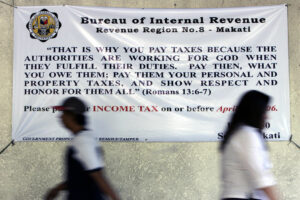Political Donations Hits Record $91M of Crypto Pre 2024 Election
Budget gap narrows in November


THE National Government’s (NG) budget deficit narrowed to P93.3 billion in November from a year ago, amid tepid revenue growth and a decline in spending.
Data from the Bureau of the Treasury (BTr) released on Thursday showed the fiscal gap shrank by 24.8% from the P123.9-billion deficit in November 2022.
Month on month, the November deficit widened from the P34.4 billion in October.
“The National Government ran a P93.3-billion budget deficit in November 2023, declining by 24.75% (P30.7 billion) from a year ago due to the 2.82% growth in revenue collection alongside a 4.69% contraction in public spending,” the BTr said in a statement.
In November, revenue collections rose by 2.8% to P340.4 billion, from P331.1 billion in the same month in 2022.
Tax revenues declined by 8.9% year on year to P286 billion in November, amid a drop in collections by the Bureau of Internal Revenue (BIR) and Bureau of Customs.
BIR revenues decreased by 11% year on year to P210.2 billion last month, while Customs collections slipped by 2.7% to P73.7 billion. Other tax offices collected P2.1 billion, up 90.9% a year prior.
On the other hand, nontax revenues more than tripled to P54.4 billion in November, as the Treasury posted a 686% jump in revenues to P41.5 billion from just P5.3 billion last year. Other offices saw an 8.8% increase in revenues to P12.9 billion.
Income from the Treasury department was “primarily driven by higher dividend remittances and NG share from PAGCOR (Philippine Amusement and Gaming Corp.) income,” the BTr said.
However, state spending slumped by 4.7% to P433.6 billion in November, from P455 billion a year ago.
The BTr attributed the decline to a drop in tax allotment shares of local government units, lower direct payments from development partners for foreign-assisted rail transport projects, as well as the different schedules of big-ticket disbursements for infrastructure and social welfare projects.
Primary spending — which refers to total expenditures minus interest payments — fell by 10.2% to P385.1 billion year on year from P428.9 billion. Meanwhile, interest payments rose 86% to P48.5 billion in November.
11-MONTH GAPFor the January-to-November period, the budget gap narrowed by 10.1% to P1.11 trillion from a year earlier. This represents 74.1% of the programmed P1.499-trillion deficit for the full year.
Revenue collection rose by an annual 8.8% to P3.6 trillion as of end-November, representing 95.58% of the P3.729-trillion target for 2023.
Tax revenues rose by 7.3% to P3.18 trillion, while nontax revenues climbed by 22.9% to P381.9 billion.
The BIR collections jumped by 8.6% to P2.34 trillion in the 11-month period, already accounting for 88.77% of the P2.64-trillion target.
Customs collections went up by 2.9% to P812 billion, which made up 93% of the full-year target of P874.2 billion.
BTr revenues increased by 46% to P216.3 billion as of end-November. This is more than triple the P58.3-billion program for the year, thanks to “higher dividend remittances, interest income from BTr’s managed funds and NG deposits, NG share from PAGCOR and MIAA (Manila International Airport Authority) profit, and government service income.”
Meanwhile, government spending went up by 3.6% to P4.68 trillion as of end-November, accounting for 89.42% of the full-year expenditure program.
For the 11-month period, primary spending increased by 1.32% to P4.1 trillion, while interest payments jumped by 23.6% to P567.7 billion.
“Our 2023 budget deficit estimate could reach P1.38 trillion that would fall short of the government’s program deficit target of P1.499 trillion,” Union Bank of the Philippines, Inc. Chief Economist Ruben Carlo O. Asuncion said in a Viber message.
“Key assumption behind this sanguine fiscal deficit outlook is a government prioritizing deficit and debt management as we close the year amid higher interest rate pressures on cash disbursements,” he added.
Meanwhile, Rizal Commercial Banking Corp. Chief Economist Michael L. Ricafort in a note said continued tax reform measures and intensified tax collections may lead to a narrower budget deficit, reduced borrowings, and slower increment in the outstanding National Government debt.
These new tax reforms would be complemented by easing inflation, especially if prices continued to stabilize towards the central bank’s 2-4% target in the coming months, he said. — Keisha B. Ta-asan











